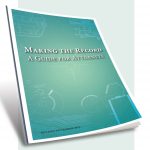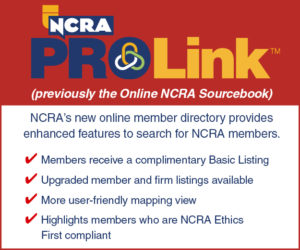By Melody Jeffries Peters
1995 was the first year Professor Greg Munro at the Alexander Blewett III School of Law invited me into the classroom on the University of Montana campus to do a realtime deposition for 85 future lawyers. Though we’ve never kept track, we know we’ve done it for 15 years for sure, so I’ve been afforded the opportunity to address well over 1,200 students. These students become attorneys, and I’ve subsequently encountered a large number of them in my work.
Each year we do a mock deposition about a real case that Professor Munro had involving drinking in a livestock barn and a subsequent horse accident. The demonstration is interactive, educational, and funny. When they talk about drinking only one beer, I quickly write: “Liar, liar, pants on fire,” and very quickly we’ve got the students’ attention. When the attorneys misspeak, I toss in: “Come on, you gotta spit it out.” Laughter erupts, and we are all truly enjoying this!
After we complete the mock deposition, I’m given the floor. This year, we handed out a number of iPads so the students could view CVNet and try their hand at it. Technology has changed greatly over the years, but I find it’s useful showing the deposition on a big screen of some kind. I explain the challenges of technology and how it’s not my forte and that, by default, since I sign the checks in my office, I am the IT department, but the first two letters are SH! They nod in sympathy.
This is also my chance to explain why reporters can be reluctant to do realtime. I share the story of covering court where the couple’s names were Yvonne and Al. Yvonne and Al did everything together. Yvonne and Al were good parents. My stroke for and is A-N. My stroke for al is A-L. The judge was seeing a number of creative uses of the word anal that day.
Working in Montana, reporters can wear a lot of hats. I get to familiarize the group with all the different kinds of reporting, and I touch on official, freelance, and CART work.
I grab their collective ears and tell them I have to know when the case involves Mr. Pierce and Mr. Pearce, and the key is I need to know ahead of time. “Ankylosing spondylitis”? Share that word with your reporter before the deposition, I tell them. Deadlines? Make sure you address those too, I say.
I cover a vast array of topics from marking exhibits to scheduling, and from enunciating to courtroom protocol. I remind them I’m trying to make a record, not set one, so they need to speak slowly. Videotaping, video conferencing … we cover it all at breakneck speed, violating my own aforementioned rule.
Handouts? You bet. We provide NCRA’s “Making the Record” brochure along with some swag and a few articles on who’s responsible for paying the reporter’s bill. [Ed. Note: The Making the Record materials have been expanded through the National Court Reporters Foundation. See sidebar for more information.] My office creates a legal-sized laminated list of every attorney and law firm in the county that we give to the students. This list is the best marketing tool ever. I provide a transcript of the deposition for the students to work with, which becomes a learning and teaching tool.
The presentations and transcript production I do at the law school are unquestionably the best pro bono work I can do as a firm owner. Because of this exposure, I’ve been asked to do seminars for lawyers, I did a PowerPoint presentation for the New Lawyers Group held at the law school, and I’ve been included as a sponsor for the Women’s Law Caucus, to name just a few. At the law school’s luncheon, I have been recognized, along with other volunteers, as a contributor to the success of the law school.
This year Professor Munro’s thank-you note said that he’d received the most comments ever about our demonstrations and he couldn’t thank me enough. However, I am forever grateful for the chance to strengthen the relationship between attorneys and court reporters. Every lawyer loves to win in court, but who doesn’t love a win-win situation? The law school gets a relevant presentation in realtime, I get to meet aspiring lawyers about to enter the field, we promote NCRA, and everybody is better off because of our collaboration. That’s a win in my book!
Melody Jeffries Peters, RDR, CRR, CRC, is an agency owner and freelancer in Missoula, Mont. She can be reached at mjeffries@montana.com.
 NCRF’s “Making the Record” tools help reporters teach lawyers
NCRF’s “Making the Record” tools help reporters teach lawyers
The “Making the Record” brochure, originally created in 1937, has been updated over the years to help the bench and bar better understand the factors that make a clear record and is now housed as part of the Legal Education program materials provided by the National Court Reporters Foundation. The materials include not only a free, downloadable pdf of the brochure, but a Powerpoint presentation that can be adapted by reporters for the audience, outlines, and handouts that can be presented as part of a presentation. Materials are available at NCRA.org/NCRF/LegalEd.
NCRF’s programs are supported by tax-deductible donations to NCRF.









